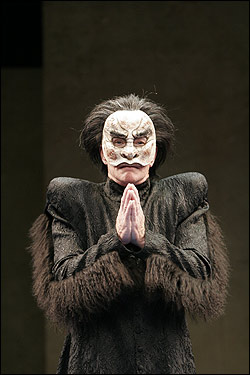Things I Would Rather Do Than Sit Through the Entirety of the Seattle Rep’s Latest Production:
- Become a vegan.
- Vote Republican.
- Spend Thanksgiving with Joan and Melissa Rivers.
- Inform my mother what I really did during college.
- Pound my skull against a cinder block until one or the other breaks in half.
This list was composed during intermission of director Andrei Belgrader and Shelley Berc’s new adaptation of Carlo Gozzi’s 18th-century commedia, The King Stag (ends Saturday, Oct. 22; 206-443-2222, www.seattlerep.org). And I’ll admit that a quick, desperate rereading of the list just as the bell for the Act 2 curtain was ringing made me duck out the theater’s doors. I wasn’t the only one. If you find yourself in a room this month filled with more pity and less laughs than the Bagley Wright Theatre, you will either be at a funeral parlor or inside the Rep’s next board meeting. Yes—it’s that bad. (At least the only half I subjected myself to.)
And it’s that bad from the beginning, when Michael Urie, playing Cigolotti, wheels out estimable character actor Séan G. Griffin, who’s costumed in a large bird suit and stuck in an oversized gilded cage. Urie is there to tell us that he’s the faithful assistant of Griffin’s Durandarte, a magician who’s been transformed into a parrot. In his iffy approximation of an Italian accent, Urie has a lot of other fanciful exposition to share with us about the magical land of Serendippo, and a lot of clowning with the audience to do— unfortunate half-price ticket holders are seated onstage for easy access, and Urie even climbs into the balcony to playfully harass people in those cheap seats. This could’ve worked, except that Urie, a cute, pleasant performer, isn’t particularly funny, particularly not when he’s given about 10 minutes of dead air to fill.
Excruciating, oppressive longevity is evidently a goal. Entrances and minor set changes are choreographed with dirgelike solemnity, and pauses between setups and punch lines are observed as though they were a time for sacred and holy reflection. The whole production is burdened by an odd, near somnambulant gravity; you feel like you’re intruding on a very serious, slow-moving rehearsal in which things just aren’t going very well (Sssssh! We’re working on a comedy here!). The rigorously wan performers seem either to be on methadone or dispiritedly wishing they were. When Angela (Caroline Hall), the most honest of three young women pledging her love to wife-seeking King Deramo (Todd Waring), bleats, “Heaven give me the strength to get through this!” you may want to holler an amen. Hall is under the delusion that she’s preparing for Saint Joan; Kelly Mak, whose would-be bride Clarice secretly loves modest young Leandro (Nathan Smith), is equally humorless.
Deramo’s eventual selection of Angela as his mate spurs the furious envy of his supposed comrade Tartaglia (R. Hamilton Wright), who, by means of a secret incantation, manages to inhabit Deramo’s body after turning him into a deer. Belgrader attempts to molest such whimsy into huge belly laughs by forcing everyone to push each failed joke past the breaking point—and then several yards further—under the apparent belief that, eventually, we’ll give in out of sheer exhaustion. This can be the only explanation for any number of unusually unfunny moments from some usually funny people. Sarah Rudinoff, as part of her brassy Smeraldina’s effort to be chosen by Deramo, has to sing “My king!” over and over and over again, despite the fact that it doesn’t garner more than a chuckle the first time. The masked Wright’s villainous Tartaglia, bedecked in what looks like old monkey fur, has a bad stutter—by which I mean he stutters, and it’s done b-b-b-badly—and an endless bit involving fake vomiting into a bucket.
In case extended fake vomiting isn’t enough indication, I’ll note that Belgrader and Berc’s adaptation is infantile in the extreme, but not in the punch-drunk, innocently knockabout way that infants—and lowbrow comedy—can be funny. There’s an embarrassing reliance on anachronistic interjections: After Wright finishes throwing up, he drinks his vomit, turns to the groaning audience, and growls, “Pussies!”
Venison may be an acquired taste, but The King Stag is dead deer that will upset almost any stomach.








